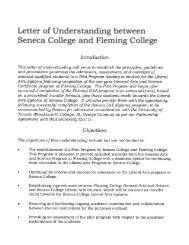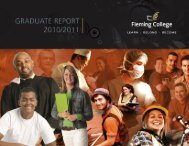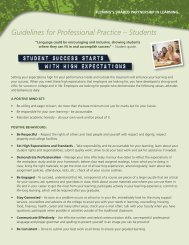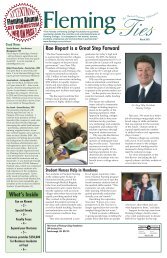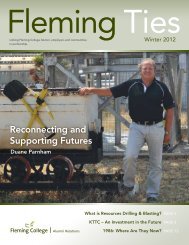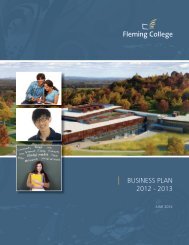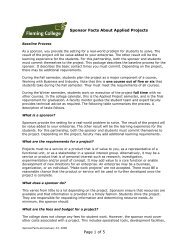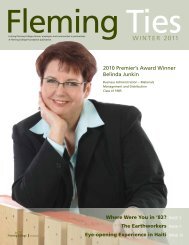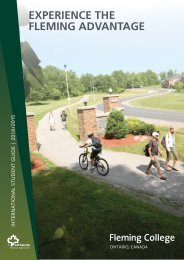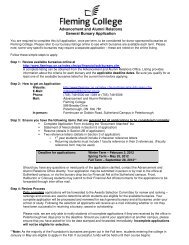FALL 2013 - Fleming College
FALL 2013 - Fleming College
FALL 2013 - Fleming College
Create successful ePaper yourself
Turn your PDF publications into a flip-book with our unique Google optimized e-Paper software.
Environmental Field Skills Certificate<br />
Program Highlights<br />
This new Continuing Education Certificate, offered by our School of<br />
Environmental and Natural Resource Sciences, provides hands-on<br />
activities and skills in the identification, sampling, measurement and<br />
classification of organisms and habitats within our ecosystem. Learn<br />
practical techniques and protocols for the collection, recording and<br />
reporting of field data, as well as safe field practices. The certificate<br />
comprises six courses plus a two-week field placement. All courses<br />
take place at Frost Campus and run during the daytime. Enrol in all the<br />
courses within the certificate, or take one or more courses at a time,<br />
depending on your needs and interests.<br />
The courses are available starting in May as well as in January, with the<br />
exception of the Field Placement course, which is offered starting in<br />
August and again in April.<br />
Is This for You?<br />
These Field Skills Courses are for:<br />
• University graduates who may be eligible for advanced standing<br />
entry to the Ecosystem Management Technology or Environmental<br />
Technician program, but who may need these fundamental field skills<br />
for success in these programs.<br />
• Environmental sector employees who want to enhance their portfolio<br />
of skills and increase their employment opportunities.<br />
• Community members and volunteers with an interest in learning more<br />
about our natural world.<br />
Admission Requirements:<br />
The minimum admission requirement for entrance into this program is:<br />
19 years of age or older, or an Ontario Secondary School Diploma or its<br />
equivalent.<br />
MANDATORY COURSES<br />
Ecology: Concepts and Linkages<br />
Ecology: Concepts and Linkages introduces contemporary theory,<br />
ideology and practices of ecosystem management. Students use<br />
qualitative and quantitative methodology, historical context, and<br />
selected experiences to assemble ecological data and information into<br />
knowledge that functions to benefit ecosystems. The course integrates<br />
ecology, environmental and ecosystem health sciences to assist in the<br />
understanding and sequential application of ecosystem management<br />
practices.<br />
Forest Measurement<br />
This course deals with specific measurements and assessment methods<br />
for forests. The course involves laboratory sessions and field trips.<br />
Measurement of tree height, tree diameter, basal area, land area, and<br />
tree volume is studied. The Canadian Fire Weather Index system is<br />
introduced. Fixed area sampling, point sampling, tree marking, and fuel<br />
loading are field trip topics.<br />
Soil Studies I<br />
The Common Lecture/Lab portion of the Soil Studies course provides an<br />
introduction to the physical and chemical properties of soils. Students<br />
develop skills in the identification and classification of soil, physical and<br />
index properties, textures, soil moisture, soil porosity, and other aspects<br />
of soil science using a variety of field and laboratory methods.<br />
Soil Studies II course for the Ecosystem Management and<br />
Forestry<br />
Technician Programs continues with physical and chemical properties<br />
of soils and introduces the biological component required for the understanding<br />
of forest soils. The student will determine soil textures, pH;<br />
moisture regimes and drainage, identification of mineral and organic soil<br />
profiles: application of the Forest Ecosystem Classification methodology,<br />
and perform a soil/site description in the field. Throughout the course<br />
analytical skills will be developed that are typical of site evaluation and<br />
environmental studies.<br />
Trees and Shrubs Of Ontario<br />
This course deals with the identification of approximately 100 species of<br />
trees and shrubs of importance to those managing the forests resources<br />
of Ontario. Throughout the semester identification features for common<br />
trees and shrubs in both summer and winter condition are introduced<br />
and applied. A number of field trips are utilized to assist students with<br />
their identification skills. In the weekly lecture series topics such as<br />
tree growth, reproduction, photosynthesis, respiration, forest ecology<br />
and uses of trees will be introduced. At the completion of the course<br />
students will have a sound working knowledge of dendrology. The skills<br />
introduced in this semester may then be used in following semesters<br />
when working with Forest Ecosystem Classification, Restoration Ecology,<br />
Conservation Planning and other habitat management situations.<br />
Wildlife Observation Skills<br />
This course is an introduction to a range of skills in wildlife observation.<br />
A variety of wildlife species may be present in an environment despite<br />
not being seen. Important skills include visual and auditory identification<br />
of wildlife signs. The primary emphasis in this course will be on<br />
identification of wildlife signs such as tracks, trail patterns, scat, skulls,<br />
impacts on the environment, bird song and amphibian calls. Whenever<br />
possible it is important to achieve visual observation and documentation<br />
of wildlife. Photography will be examined as a tool to document wildlife<br />
and their signs. Studies of wildlife observation technology will include<br />
an evaluation of binoculars and spotting scopes. Wildlife observation<br />
projects and groups will be reviewed including the Christmas Bird Count<br />
and breeding bird surveys. Lab instruction will be augmented with field<br />
trips to observe signs of local wildlife and when possible to document<br />
actual wildlife sightings.<br />
Field Placement – Field Skills<br />
This 80-hour (2 week) course will take place during August. The student<br />
will be engaged in a Field Placement for an organization whose primary<br />
focus and core business is of an environmental nature.<br />
59<br />
These courses will run in 2014. To reserve your spot or for more information, contact:<br />
Joy Cyr at 1-888-269-6929 ext. 3310 or joy.cyr@flemingcollege.ca



